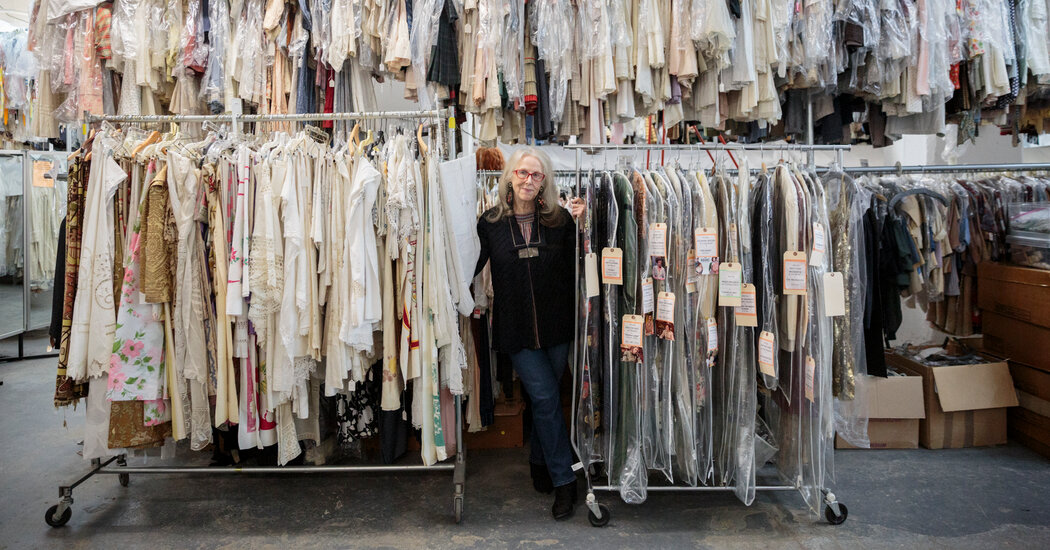Helen Uffner has dressed Broadway, Hollywood and TV shows for more than 40 years. But high-rise developers and Amazon distribution centers are making it impossible to store her extraordinary vintage collection.
Helen Uffner began her love affair with old clothes as a young teenager, wandering into estate sales near her family’s home in Queens, unnerving her father, who had immigrated to this country as a Holocaust survivor and worried that people would think he could not afford to outfit his daughter properly. As a high school student in the mid-1960s, she would go to auction houses in Greenwich Village to buy vintage clothes and antique jewelry, using her babysitting earnings. With the prospect of a career in period fashion lacking promise, she sensibly joined a management consultancy after college. Soon enough the sexism got to her so she quit and decided to monetize her passion, drawing from the large collection she had already amassed which, at the time, focused on Victorian lingerie.
Over the next 40 years or so, Ms. Uffner established a celebrated business renting out vintage clothes to theater, film and television productions from an inventory considered unparalleled. Initially, she ran the business out of her apartment — supplying the wardrobe for “Out of Africa,” “Zelig,” “The Color Purple.”
By the late 1990s, when that model was no longer sustainable, she moved to a 6,000-square-foot space in the garment district, which made it easy for Broadway costume designers to visit and for actors to come in for fittings. Within a decade though, the unforgiving pace of real estate development in New York would threaten her viability, and now, in an all-too-familiar scenario, the pandemic economy was taking an extinction-level toll.
It was a paradox though because even as the performing arts have suffered immeasurably during the past two years, film and television production in New York City has mostly returned to prepandemic levels and is ramping up. In September, Netflix opened a 170,000-square-foot studio in Brooklyn, and Ms. Uffner has been involved with one of the most anticipated series of the year, “The Gilded Age,” Julian Fellowes’s follow-up to “Downton Abbey,” set in turn-of-the-century New York (and starting Monday on HBO).
Challenges began for Ms. Uffner in 2006, when the landlord of the building she occupied in Midtown “invited” her, as she put it, to break her lease early. He was selling the building and wanted her out, but moving thousands of racks of clothing was going to be an ordeal. At the same time commercial rents were soaring and the city’s garment industry had all but disappeared, large loft-like spaces given over to corporate offices. Eventually, in 2008, Helen Uffner Vintage Clothing moved to Long Island City, after its proprietress faced fines of $1,000 a day if she did not vacate her existing space.
The transition was not easy. Fashion houses, which also rent from the collection as a means of inspiration, began returning things by FedEx, Ms. Uffner told me, “as if we were in another state.” But over the next several years, Long Island City became popular enough that it was now a place where a marketing executive at Ralph Lauren might actually live. So by 2018, Ms. Uffner inevitably found herself in the same predicament she had faced earlier — the building she was in near Queens Plaza would be redeveloped and she would have to move. She ultimately settled into another space in Long Island City only to confront the drama all over again — her current building is planned for demolition to accommodate the construction of a high-rise.
In the past, Ms. Uffner had several competitors, also independently owned, but nearly all have fallen away. If she shut down, the impact on the costume industry would be profound. Tom Broecker, an Emmy Award-winning costume designer who has relied on Ms. Uffner for decades, described her collection of women’s wear from the early 20th century as extraordinary. “In the entire world, Helen is the only person who has cotton dresses from that period,” he told me.
Even a move to Industry City, in Brooklyn, where the city has been trying to revive garment manufacturing, would be difficult from his point of view. In addition to film and theater projects, Mr. Broecker works on “Saturday Night Live,” where he might have to come up with a piece of old clothing in a span of two hours, making a trip from Rockefeller Center to a semi-inaccessible quarter of Brooklyn unfeasible.
Understanding the importance of her enterprise to New York’s creative life, the city via the Mayor’s Office of Media and Entertainment has said it is trying to help Ms. Uffner relocate, but without broad commercial rent regulation, there is little that can be accomplished. Over the years, she told me, landlords have added fees to monthly rent bills with impunity. In the beginning she was paying rent, electricity and property tax. In a subsequent space, the landlord added gas, and then came requirements to contribute to the local business improvement district.
While Covid has tanked the price of office leasing, vast warehouse space of the kind Ms. Uffner needs is at a premium because of the demand coming from Amazon and other e-commerce sites that have become even more attractive to consumers during the pandemic. The city suggested a space in Hudson Yards, she told me, that was going to cost more than five times what she was paying.
Five Movies to Watch This Winter
1. “The Power of the Dog”: Benedict Cumberbatch is earning high praise for his performance in Jane Campion’s new psychodrama. Here’s what it took for the actor to become a seething alpha-male cowboy.
When she brought that news to colleagues at Costume Industry Coalition, they laughed sympathetically. The coalition was formed in May 2020 as a group of about 50 small businesses and artisans supplying the entertainment sector. The shutdown of Broadway and other live events created a devastating ripple effect on dozens of ancillary creative workers — seamstresses, embroiderers, beaders, cloth dyers, fabric pleaters. The coalition work force is 71 percent female, and a third are immigrants representing 39 countries.
A founder of the coalition, Brian Blythe, who with his partner John Kristiansen runs a well-known costume shop on West 38th Street, endured a 50 percent loss last year compared to 2019, he told me, a modest improvement over the 70 percent loss the company suffered in 2020.
“We’re watching Broadway on a daily basis — up down, up down, shows canceling. The volume of work we’re accustomed to just isn’t there yet.”
On Wednesday morning, advocates for the performing arts lobbied Congress for help during a hearing titled “The Power, Peril and Promise of the Creative Economy.” Nydia Velázquez, who represents New York’s seventh Congressional district, said that the wounds the pandemic inflicted on the arts were clearly “deep and painful” and that related businesses would need more support and investment to survive.
Now in her 70s, Ms. Uffner has found the prospect of moving for a fourth time especially daunting. She may simply choose to sell the business, she said, but there is hardly any guarantee that the buyer would — or could — be based in New York, and that depresses her. The pandemic has unfolded here in thrall of a paranoid rhetoric about the dark consequences of a billionaire exodus with the relevant voices paying virtually no attention to the dangers of losing people central to the city’s identity who will give up not because Miami is equally fun but because they have no choice.
“I have been making the joke that the emperor has no clothes,” Ms. Uffner said, “because who will actually dress him?”




























